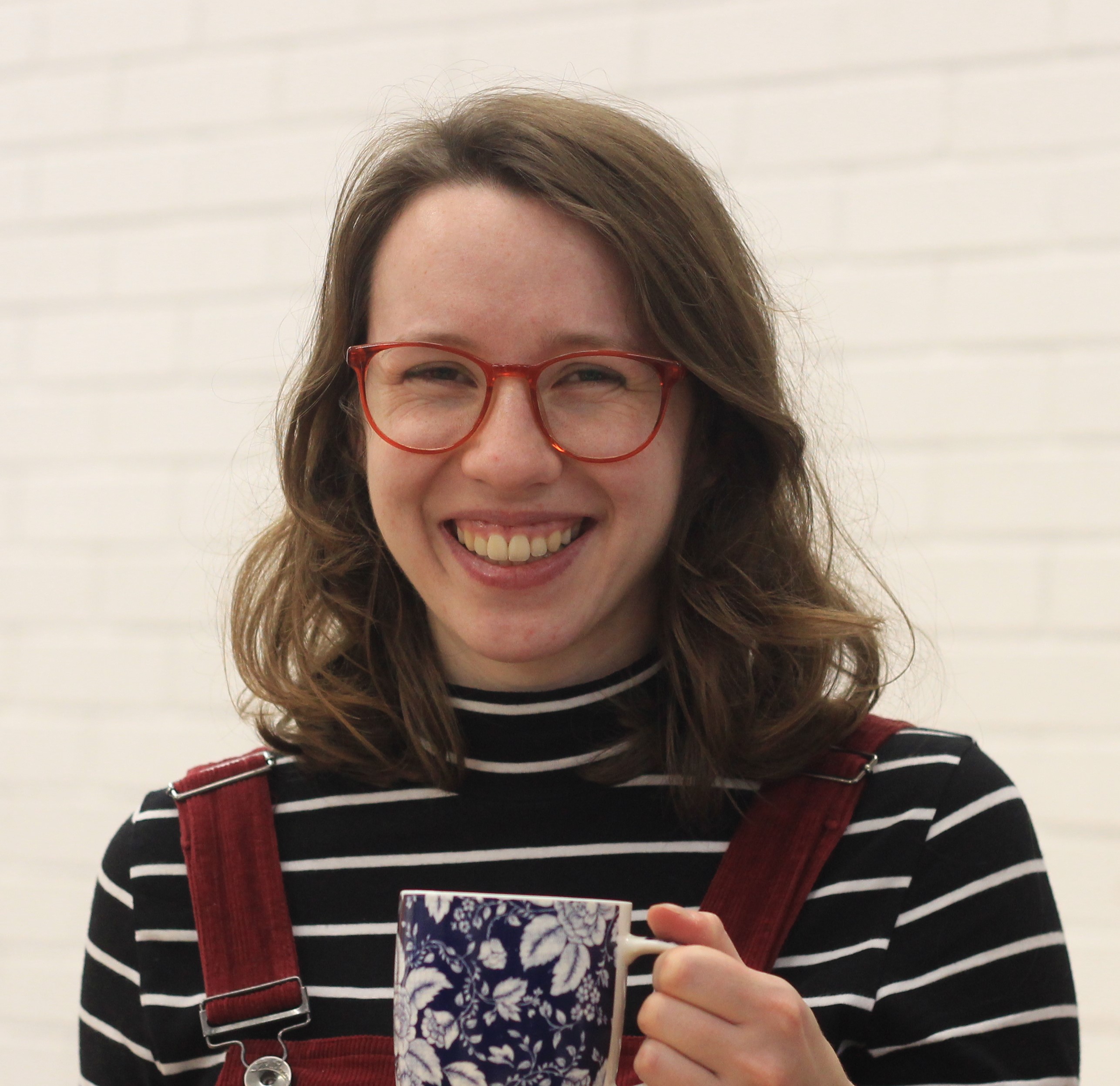Notes: Video Game Localisation Tester
 My name is Aileen and I currently work at SCILT, Scotland's National Centre for Languages. My role involves coordinating a range of projects and events to help the organisation promote and support the teaching and learning of languages in Scotland.
My name is Aileen and I currently work at SCILT, Scotland's National Centre for Languages. My role involves coordinating a range of projects and events to help the organisation promote and support the teaching and learning of languages in Scotland.
What languages have you learned?
I’ve learned both German and English since I was a baby (my Dad spoke to me in English and my Mum spoke to me in German), though I mostly spoke German until we moved to Scotland unless my grandpa was visiting.
I started learning French in P7 and continued it up to Higher in secondary school, though I’m quite rusty now! I found French much easier because lots of English and German words are similar to French words, so having both languages to draw from really helped me ‘decode’ French.
I also learned Spanish for a semester at university, but I found it much more complicated than learning a language when I was younger! Once again I liked trying to find similarities between words though.
How have any language skills helped you in your work?
My German skills got me a job called Localisation Tester, which involves testing the subtitles, menus and other text (and sometimes audio) for big-name video games. Sometimes you have to properly play your way through the game, and sometimes you get ‘debugs’ which help you get through it faster, but you’re still spending your day largely on a games console or PC gaming platform working your way through a structured game plan to make sure you can find/trigger all the pieces of text in the game to check them. For German, common mistakes include the words not quite fitting into the space and different tenses and pronouns, but in some languages it can also be very nuanced, for example between Latin American Spanish and Castellano Spanish (spoken in Spain) where the same words can have multiple (and sometimes rude!) meanings depending on which country you’re from, which is why there are testers for both regions.
on a games console or PC gaming platform working your way through a structured game plan to make sure you can find/trigger all the pieces of text in the game to check them. For German, common mistakes include the words not quite fitting into the space and different tenses and pronouns, but in some languages it can also be very nuanced, for example between Latin American Spanish and Castellano Spanish (spoken in Spain) where the same words can have multiple (and sometimes rude!) meanings depending on which country you’re from, which is why there are testers for both regions.
I was actually headhunted via LinkedIn because I listed my languages on my profile – before that I had no idea that this type of job existed! The other Localisation Testers were a mixture of native speakers and those who had learned the language thoroughly, for example studying it at university, living in the country for a time, or even learning it through a partner or spouse who’s a native speaker.
It was so fun getting to know and spend time with such a diverse and interesting group of people, learning insider information about their countries, and sometimes even getting  to try foods from each other’s countries! I also learned a lot about spreadsheets, as well as the long and intricate process of producing a video game – not to mention drastically improving my gaming skills, because I’d never really played video games properly until then!
to try foods from each other’s countries! I also learned a lot about spreadsheets, as well as the long and intricate process of producing a video game – not to mention drastically improving my gaming skills, because I’d never really played video games properly until then!
What benefits do you think language skills bring?
Meeting new friends at home and abroad, and generally opening doors in the most unexpected ways. I made two really good friends from the game testing, including a German friend who I get the rare chance to keep up my speaking skills with. I think learning and knowing more languages also make sure that you stay curious, at least for me it wants to make me learn even more words and phrases in different languages.
Someone also recently told me they felt more able to relax and enjoy a new country if they knew some of the language, as it’s one less thing to worry about if you can understand a bit more of what’s going on around you and how to navigate. I’d never thought of it that way before but I think it’s a really good point!
Do you have any advice for anyone considering learning a language?
It feels like once you learn one language it can help you work out more words in other languages than you realise you’d be able to understand. I always look for words that are similar to each other and I like finding out the roots (or building blocks in the case of German, where words are often tacked onto each other to make new, longer words!) of words to anchor them in my mind a bit more. I don’t know how well this works for different alphabets of course, but the way my brain works is that I like relating vocabulary to words in a language I know, even if it’s just a sound and not a real similarity. For example, the French fenêtre and Italian finestra (window) remind me of the German Fenster, and the Spanish ventana is a similar enough with a w/v sound and the ‘ent‘ that I can remind myself of the link to try and remember it. Even without reminding me of French/Italian/German, because ventana makes me think of the word vent which I could then use that as a way to recognise the word because it’s an opening in a building. Another example for dog lovers is the word zampa in Italian which means paw. We taught it to my friend’s (Scottish) collie by saying zamPAW and that’s always helped me remember it. Although I probably won’t be very likely to need to know it, I can make use of it if I ever meet an Italian pup!
are similar to each other and I like finding out the roots (or building blocks in the case of German, where words are often tacked onto each other to make new, longer words!) of words to anchor them in my mind a bit more. I don’t know how well this works for different alphabets of course, but the way my brain works is that I like relating vocabulary to words in a language I know, even if it’s just a sound and not a real similarity. For example, the French fenêtre and Italian finestra (window) remind me of the German Fenster, and the Spanish ventana is a similar enough with a w/v sound and the ‘ent‘ that I can remind myself of the link to try and remember it. Even without reminding me of French/Italian/German, because ventana makes me think of the word vent which I could then use that as a way to recognise the word because it’s an opening in a building. Another example for dog lovers is the word zampa in Italian which means paw. We taught it to my friend’s (Scottish) collie by saying zamPAW and that’s always helped me remember it. Although I probably won’t be very likely to need to know it, I can make use of it if I ever meet an Italian pup!
Any tips on how best to approach communicating in a language you have little knowledge of?
 In my experience people always appreciate that you’re making an effort to speak their language and are happy to give you pointers for pronunciation and vocab! Usually being surrounded by a language when you’re travelling beats hours of practice because hearing it in context makes a huge difference. So just go for it, and don’t worry about mispronouncing something, at least you’re trying and not just assuming that everyone should know some English! Failing that, the classic combination of pointing and miming has rarely failed me, and often ensured some laughs which actually helped me learn the terms because of associating them with that moment.
In my experience people always appreciate that you’re making an effort to speak their language and are happy to give you pointers for pronunciation and vocab! Usually being surrounded by a language when you’re travelling beats hours of practice because hearing it in context makes a huge difference. So just go for it, and don’t worry about mispronouncing something, at least you’re trying and not just assuming that everyone should know some English! Failing that, the classic combination of pointing and miming has rarely failed me, and often ensured some laughs which actually helped me learn the terms because of associating them with that moment.
In your experience, would you say cultural awareness is important?
Definitely – in this day and age where people travel and move around much more it would feel almost backward to not make an effort to learn at least a little bit about other cultures and countries’ customs before visiting or when you get to know someone with a different background – especially because it’s so easy to access this kind of information and immerse yourself through films, TV shows and music.
Return to Job Profiles